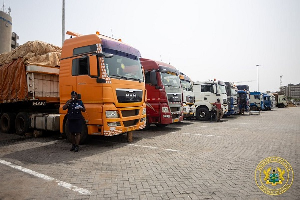Tony Blair saw rural Africa, where the bulk of the continent's population live, for the first time yesterday. Although he has made many speeches over the past year about Africa, he has seen little of its poverty at first hand. On the road to Nankasi, a village in a clearing in the equatorial jungle, two hours' drive from the Ghanaian capital Accra, Mr Blair was able to put flesh and blood to the speeches he has made about the continent. He saw the women and children carrying huge burdens on their heads; the corrugated-iron roofs, the abandoned cars, the mud huts. In Nankasi, he was mobbed by hundreds of villagers.
"It moved his little heart," a colleague travelling with him said. "He could not be other than affected by the dignity of the Ghanaian villagers."
At Nankasi, he was given a vivid lesson why - to use his words to Labour's conference last autumn - Africa is a "scar on the conscience of the world".
The village is dependent mainly on cocoa. The local business, the Kuapa Kokoa Cooperaive, is supported by Comic Relief. When Britain was the colonial power, it encouraged Ghana to concentrate on cocoa production. Today, it is its second biggest export, but this lack of diversification means the country is vulnerable to a drop in commodity prices: cocoa prices have slumped since 1999.
On top of this, Mr Blair was told that Ghana suffers from unfair trade restrictions. The French government, protecting the sugar trade in its overseas territories, has ensured high tariffs to block any attempt by Ghana to export its cocoa as chocolate. Instead, it has to export cocoa to Germany where it is manufactured into chocolate bars and exported to Britain.
Seth Takyi, one of those in Nankasi waiting to see the prime minister, said: "We have everything we need if they would lift the tariffs and restrictions." Joseph Taylor, one of the workers, said he earned a dollar a day.
Mr Blair, the first prime minister to visit Ghana since Harold Macmillan in 1960, has made Africa a personal crusade, combining his Christian socialism and his mantra since September 11 that the world will be safer if failed states are tackled. "We have got to make sure that the developing countries get access to the markets," he said. "It is a win-win situation. All the evidence shows that the developed countries benefit more, too. It is in our mutual self-interest."
Mr Blair said the world's rich countries must practise what they preach. In some cases, tariffs of up to 300% were slapped on African agricultural produce, he said, while rich OECD countries received farm subsidies worth ?320bn a year, equivalent roughly to Africa's entire GDP. But he has admitted that the crunch will come at the summit of the Group of Eight leading industrialised countries in Canada in June, when he will face opposition from the US, Japan and Germany to his proposed trade reforms.
An aide said that when the prime minister did sit down at the table, his political stance would be reinforced by his memory of Nankasi.
Today, Mr Blair will visit Sierra Leone, where he will take credit for Britain's military intervention two years ago. Tomorrow, he will see Africa in the raw again, when he visits an HIV/Aids clinic in Senegal.
General News of Saturday, 9 February 2002
Source: Ewen MacAskill in Accra for guardian












